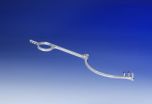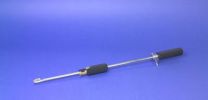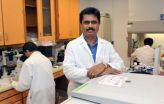(Press-News.org) One in eight Americans will fall prey to Alzheimer's disease at some point in their life, current statistics say. Because Alzheimer's is associated with vascular damage in the brain, many of them will succumb through a painful and potentially fatal stroke.
But researchers led by Dr. Dan Frenkel of Tel Aviv University's Department of Neurobiology at the George S. Wise Faculty of Life Sciences are working on a nasally-delivered 2-in-1 vaccine that promises to protect against both Alzheimer's and stroke. The new vaccine repairs vascular damage in the brain by rounding up "troops" from the body's own immune system.
And in addition to its prophylactic effect, it can work even when Alzheimer's symptoms are already present. The research on this new technology was recently accepted for publication in the journal Neurobiology of Aging.
A natural way to fight Alzheimer's
"Using part of a drug that was previously tested as an influenza drug, we've managed to successfully induce an immune response against amyloid proteins in the blood vessels," says Dr. Frenkel, who collaborated on this project with Prof. Howard L. Weiner of Brigham and Women's Hospital, Harvard Medical School. "In early pre-clinical studies, we've found it can prevent both brain tissue damage and restore cognitive impairment," he adds.
Modifying a vaccine technology owned by Glaxo Smith Kline, a multinational drug company, Tel Aviv University's new therapeutic approach activates a natural mechanism in our bodies that fights against vascular damage in the brain.
The vaccine, Dr. Frenkel explains, activates macrophages — large proteins in the body that swallow foreign antigens. When the vaccine activates large numbers of these macrophages, they clear away the damaging build-up of waxy amyloid proteins in our brain's vascular system.
Animal models showed that once these proteins are cleared from the brain, further damage can be prevented, and existing damage due to a previous stroke can be repaired.
A new road to an Alzheimer's cure?
Could the breakthrough lead to both a vaccine and a long-sought cure for Alzheimer's disease? "It appears that this could be the case," says Dr. Frenkel, who worked on the study with his doctoral student Veronica Lifshitz and master degree students Ronen Weiss and Tali Benromano. "We've found a way to use the immune response stimulated by this drug to prevent hemorrhagic strokes which lead to permanent brain damage," he says.
In the animal models in mice, Dr. Frenkel's team worked with MRI specialist Prof. Yaniv Assaf and his Ph.D. student Tamar Blumenfeld-Katzir of Tel Aviv University's Department of Neurobiology and then with "object recognition" experiments, testing their cognitive functioning both before and after administration of the vaccine. MRI screenings confirmed that, after the vaccine was administered, further vascular damage was prevented, and the object recognition experiments indicated that those animals treated with the new vaccine returned to normal behavior.
Dr. Frenkel believes that this approach, when applied to a human test population, will be able to prevent the downward health spiral of Alzheimer's and dementia. The vaccine could be given to people who are at risk, those who show very early symptoms of these diseases, and those who have already suffered strokes to repair any vascular damage.
So far the vaccine has shown no signs of toxicity in animal models. Dr. Frenkel is hopeful that this new approach could lead to a cure, or at least an effective treatment, for the vascular dementia found in 80% of all people with Alzheimer's.
###
American Friends of Tel Aviv University (www.aftau.org) supports Israel's leading, most comprehensive and most sought-after center of higher learning. Independently ranked 94th among the world's top universities for the impact of its research, TAU's innovations and discoveries are cited more often by the global scientific community than all but 10 other universities.
Internationally recognized for the scope and groundbreaking nature of its research and scholarship, Tel Aviv University consistently produces work with profound implications for the future.
END
Ever get a flu shot and still get the flu? If so, there's new hope for flu-free winters in the years to come thanks to a new discovery by researchers who found that a drug called DMXAA, originally developed as anti-tumor agent, enhances the ability of flu vaccines to ward off this deadly virus. A new research report appearing in the March 2011 issue of the Journal of Leukocyte Biology (http://www.jleukbio.org) suggests that DMXAA could assist flu vaccines by causing the body to produce its own antiviral proteins, called interferons, which interfere with the virus's ability ...
Be it a heart transplant or a Cesarean section, every operation requires a wide variety of surgical instruments, from simple retractors, clamps, scalpels and scissors to more specialist devices such as cerclage wire passers, which surgeons employ to repair long, oblique fractures in bones. These are shaped in such a way as to half encircle the broken bone, and incorporate a hollow channel. In a process not unlike stringing a parcel for posting, thread or wire is fed through the channel around the damaged bone and then knotted in place, both to support the bone and to hold ...
More and more often, abdominal surgeries are being carried out in a minimally invasive manner. A small incision in the abdominal wall is sufficient for the surgeon to be able to insert the instrument and make the organs visible with an endoscope. This technique is gentler and does not stress the body as much as traditional surgeries do. However, these minimally invasive surgeries pose a special challenge to the surgeons. In particular, the suturing – meaning joining the tissue with needle and suture material - demands great skill and dexterity. Very often, piercing the ...
Part of the answer to how and why primates differ from other mammals, and humans differ from other primates, may lie in the repetitive stretches of the genome that were once considered "junk."
A new study by researchers at the University of Iowa Carver College of Medicine finds that when a particular type of repetitive DNA segment, known as an Alu element, is inserted into existing genes, they can alter the rate at which proteins are produced -- a mechanism that could contribute to the evolution of different biological characteristics in different species. The study was ...
In an interesting bit of scientific serendipity, researchers at North Carolina State University have found that a chemical compound useful for studying the origins of intestinal birth defects may also inhibit the growth and spread of cancerous tumors.
During the screening of chemical compounds created by NC State chemist Dr. Alex Deiters, developmental biologist Dr. Nanette Nascone-Yoder found one of particular interest to her research: a compound that induced heterotaxia, a disordering or mirror-image "flipping" of internal organs, in the frog embryos she was studying. ...
A daytime sleep could have cardiovascular benefits according to new research by Ryan Brindle and Sarah Conklin, PhD, from Allegheny College in Pennsylvania in the US. Their study, looking at the effect of a daytime nap on cardiovascular recovery following a stress test, found that those participants who slept for at least 45 minutes during the day had lower average blood pressure after psychological stress than those who did not sleep. The work is published in Springer's journal International Journal of Behavioral Medicine.
Long work schedules, shift work, increased anxiety ...
A research study coordinated by Manel Esteller, researcher at Bellvitge Biomedical Research Institute (IDIBELL) has identified a substance that inhibits cancer growth by activating the so‑called "dark genome" (or non‑coding DNA) and micro‑RNA molecules. The study appears this week in the journal Proceedings of the National Academy of Sciences (PNAS).
Human body cells have a genome (the set of our DNA) encoding our proteins such as keratin in the skin or haemoglobin in blood. This genome with encoding DNA represents only the 5% of our genetic material. ...
About 1,200 criminal justice researchers as well as active and retired law-enforcement professionals from around the world are expected to attend the annual meeting of the international Academy of Criminal Justice Sciences, to be held March 1-5 in Toronto. Presentations of the latest research in the field will be made, including research presented by the University of Cincinnati faculty and students.
Recognized at the conference will be UC researchers Bonnie Fisher, professor, and Francis Cullen, distinguished professor. Fisher and Cullen will receive the 2010 Outstanding ...
Researchers from Boston University School of Medicine (BUSM) have found that patients with node negative T3 and T4 non-small lung cancer who underwent chemotherapy before surgery had more than three times the survival rate than patients who only underwent surgery. These findings currently appear on-line in the Journal of Thoracic and Cardiovascular Surgery.
The study looked at a total of 110 patients who underwent surgical resection for invasive T3 and T4 non-small lung cancer between 1979 and 2008. Forty-seven patients received neoadjuvant chemotherapy and concurrent ...
AMES, Iowa - A protein pathway that may hold the secret to understanding Parkinson's disease has been discovered and explained by Iowa State University researchers.
Anumantha Kanthasamy, a distinguished professor of biomedical sciences and the W. Eugene and Linda R. Lloyd Endowed Chair in Neurotoxicology at the ISU College of Veterinary Medicine, has been working to understand the complex mechanisms of the disease for more than a decade. He believes this recent discovery offers hope for the cure.
The research was funded by the National Institutes of Health and is published ...



